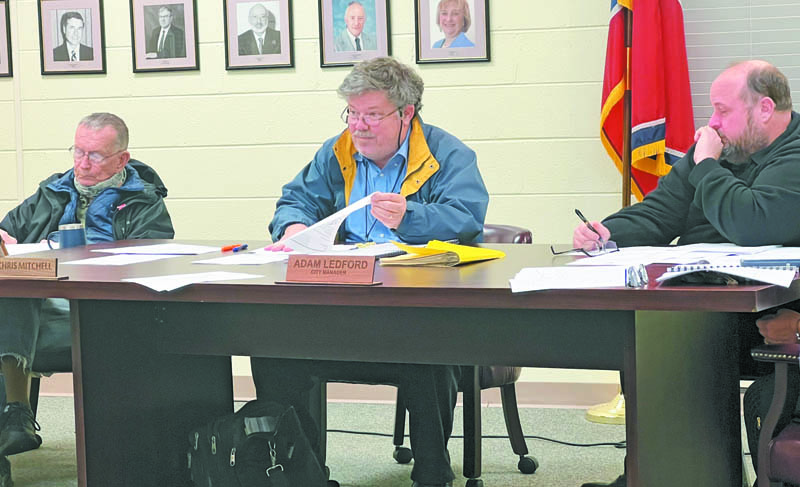Norris moves up utilities meeting date

The meeting, whose premise has been met with surprising vitriol by some of the members of the Norris Water Commission, originally was scheduled for Jan. 31.
But during Monday night’s January City Council meeting, the council voted to change the date because Water Commission Vice Chair Sue Hill said she would not be able to attend the session Jan. 31.
Also on Monday night, the council approved on second and final reading a new sign ordinance that clarifies parts of the previous ordinance, and further restricts the placement of signs along public property – especially on Andersonville Highway (Tenn. 61) within the Norris city limits.
As for the utilities issue, some of the Water Commission members have been openly hostile to the idea of the meeting, which was requested during the December council meeting by Councilwoman Loretta Painter.
Mayor Chris Mitchell, during Monday’s council meeting, outlined the “structure and topics” for the special meeting, and said that the discussion would not involve changes to the Water Commission itself.
Painter, however, has told The Courier News that she could see having the members of the City Council take over the Water Commission and serve as its members, just as councilmembers serve as the city’s Beer Board.
That would be a discussion for a later date, however, she said.
Some members of the Water Commission, during their Dec. 31 meeting, took issue with Painter’s proposal to have a City Council “conversation” about making the water and sewer utilities a city department, just like fire, police and public works, rather than being controlled separately by the Water Commission.
During the Dec. 31 meeting, in which Painter took her seat as the City Council’s new representative on the commission, Commissioner Marguerite Wilson asked Painter what “the problem is” with the current setup that would lead the council to consider changing it.
“I missed the meeting,” Wilson said of the Dec. 12 City Council meeting in which Painter proposed the special session to discuss changes to the way Norris utilities are managed.
“So I would like to know what the problem is … just so I can prepare. … And what are the benefits for doing away with the [Water] Commission?” Wilson said.
Painter noted that there was no discussion during the Dec. 12 council meeting about “doing away with” the Water Commission, only that she wanted to have “a conversation” about changes in the setup.
“The motion was to schedule a meeting to have a conversation about making the utilities a department,” she said, just like the police, fire and public works departments, whose department heads are hired and managed by the city manager.
“Of course, there would be changes in the scope of the board,” Painter added.
“The benefit is that we have hired a professional city manager, and as a councilperson, I would like to have one person to go to for all my questions,” Painter said. “It would be set up just like the police department.”
Mitchell said at the Dec. 12 council meeting that he approved of the idea of discussing the possibility of making the change.
“Part of the reason we need to look at this is because we’re adding an assistant city manager and we need to look at how the city organization can find some efficiencies,” the mayor said.
Although Painter made no mention during the council meeting about changes to the Water Commission, she told The Courier News that she could see the commission being changed to where it is made up entirely of the elected members of the City Council, rather than being a separate board as it is now, with members appointed by the City Council, including just one member of the City Council.
Painter told the other water commissioners that such a change could be made through city ordinances, and that it would not require a change in the city charter.
The move to bring the utilities under control of the city manager comes as Norris continues to struggle with state mandates to correct environmental violations in the city’s wastewater-treatment operations, which eventually will cost the city potentially in excess of $7 million. The price tag could be considerably more if construction of a new sewage treatment plant is required.
The City Council gave its approval in May 2022 to a plan from the Water Commission that calls for spending at least about $5.5 million to fix problems with stormwater overloading the city’s sanitary sewer system during heavy rains.
The council also approved the wording of a letter Mayor Chris Mitchell sent to the Tennessee Department of Environment and Conservation in response to a “director’s order” from the department that found the city in violation of water-quality regulations concerning discharges from the city’s sewage-treatment plant.
The city hired Cannon & Cannon Consulting Engineers of Knoxville to create the plan to remedy the violations. That plan, submitted to the council during the regular May council meeting, called for making the required repair beginning as soon as possible, with an estimated completion date of late 2028.
Under the engineers’ plan, the price for the bulk of the work was estimated to be $5.488 million, with a potential bill as high as nearly $7 million. That does not include the possibility the city might need to install a 750,000-gallon holding tank for stormwater runoff, at an additional cost of more than $2.1 million.
The money to pay for the upgrades will come from a “combination of grants, debt and increased sewer rates” to customers, Mayor Mitchell has said.
The engineers have been testing the sanitary sewer system to find leaks and other problems that allow stormwater to enter the sanitary sewer system.
Norris is under pressure from the Division of Water Resources to fix the stormwater runoff issue, or end up paying $23,460 in fines – or more -- for violations of state regulations regarding discharge of polluted water Buffalo Creek.
The city already has paid $4,692 of that fine to the state, and would be on the hook for the rest unless its remediation plan is carried out as scheduled.
Under state law, the city cannot use property taxes to fund the repairs, and also may not add any of those expenses to water bills.
Instead, the city must get grants and/or borrow money to pay for the upgrades, and then pay off the loans using higher sewer rates for customers. About three-fourths of Norris water customers – around 600 – also have sewer service, and would have to pay the higher sewer rates.
The estimates in the plan submitted to the council didn’t include a possible replacement of the city’s aging wastewater treatment plant, which was built in 1936 and last upgraded in the 1960s.


